The defeat of the 3 Army Radko-Dmitriev. The death of the 48 "Steel" division of General Kornilov
4 May 1915 was a critical day: it predetermined the success or failure of the German operation. On this day, the 11 corps of the German army Mackensen broke through the third line of defense of the 3 Army Radko-Dmitriev, trying to get out of the river. Visloka. But the German troops again failed to complete the task, advancing in the center and on the left flank of all on 5 - 6 km. It was only on the right flank that the Kneissel consolidated corps managed to penetrate deep into the disposition of the Russian troops and get close to the town of Zmigrod.
The delay of the German offensive led to the fact that the 3 Caucasian Corps approached the 3 of the Russian army of General Radko-Dmitriev, its units were thrown in different directions to reinforce the defense. However, this reinforcement could no longer correct the situation. The heroic resistance of the Russian soldiers was delayed by a German breakthrough for four days. But, unfortunately, in spite of the German offensive, neither the command of the Russian front, nor the command of the army still understood the situation, and did not use the precious time provided. Time to organize the counter-maneuver was missed.
Partly Russian command can be understood. Indeed, at the same time, on May 2, 1915, German troops launched strikes on the entire front — they attacked the positions of the 4th, 2nd, 1st and 10th armies. The Germans broke into the Baltic. In early May, German troops occupied Chawley, and German cavalry began to spread rapidly throughout Courland. May 7, the Germans assisted fleet occupied Libau. Russian troops began to drag themselves beyond the Dubissa River, and throughout May there were fights for the possession of pp lines. Vindava and Dubissa. The commander of the Eastern Front, Hindenburg even wanted to use the demonstration operation entrusted to him to carry out his plan for the wide coverage of the Russian army from the north and south. The German High Command had to upset him. The chief of the General Staff of Germany Falkenhayn did not want to deeply develop the offensive in Russia.
Alekseev, in order to fend off an enemy strike in the Rigo-Shavelsky region, transferred infantry divisions to the 7 division in this region. Our troops tightly covered the path on the right bank of the river. Neman to Vilna, Dvinsk and Riga, stretching the front to the Baltic Sea. The entire new front was included in the 10 army of General Radkevich, whose headquarters was in Grodno. In early June, Alekseev formed a new 5 Army under the command of Plehve from the forces of the Rigo-Shavelsky District. The 12 th army at Narew, which up to this point commanded Plehve, was led by General Churin, and the troops of the disbanded former 5 Army (on the left bank of the Vistula River) were transferred to General Xmirnov's 2 Army. The Baltic fleet, at the direction of the Stavka, was supposed to support the Plehve 5 army. On the 5 th Army Plehve was assigned the task of covering a vast territory from the r. Neman to the Baltic coast and ousting from there the German troops, relying on Riga and Dvinsk. The Plehwe army was able to stabilize the situation on this sector of the Russian front, but it was not possible to knock out German troops from this area. As a result, the German Ami captured a convenient base for the development of the offensive, which was used after the withdrawal of Russian troops from Poland.
As a result, the attention of the Russian Stavka was diverted to the north, and the command of the Southwestern Front, Ivanov and Dragomirov, was not at all concerned. Even the fact that the divisions of the 3 of the Russian army, bleeding profusely, but held the blow of the enemy, confirmed their opinion that this was only an auxiliary blow. Moreover, at the moment when the Austro-German assault force was breaking through the northern flank of the front, on the southern flank of the 9-I and 11-I Russian armies were thrown into the attack. The front headquarters were sure that they had attacked the main enemy grouping, which is going to Bukovina. They realized it only after the army of Radko-Dmitriev was driven back over Vislok. But it was too late.
By the evening of May 5, the left flank and the center of the 11 of the German army finally broke through the Russian defenses, and reached the Vislok. The combined German corps occupied the area of Zmigrod - Gloyce, and the 20-division of the 10 of the German corps captured Vetrzhno, which led to the blocking and death of the 48-division of the 24 of the army corps.
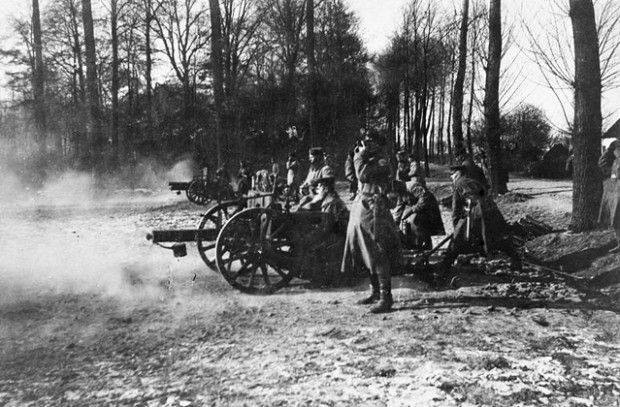
Germanic 77 Howitzers
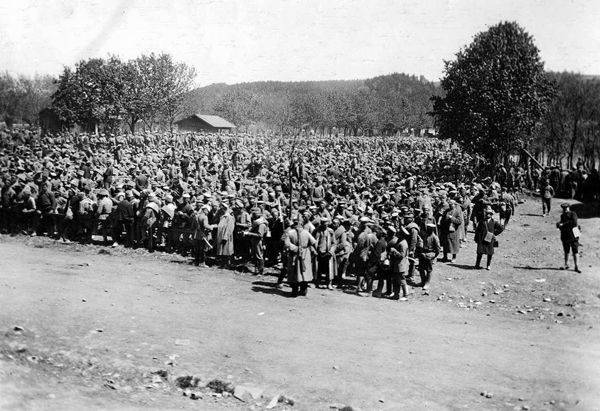
Russian soldiers taken prisoner as a result of the Gorlitsky breakthrough
The position of the 3 Army was very difficult. On May 6, German troops concentrated a strike on the center and left flank of the 3 Army (on the 3 Caucasian, 24 and 12 Corps). Despite this, the headquarters and the front command demanded a counter-offensive from Radko-Dmitriev. Radko-Dmitriev took the left flank back, brought the 21 corps to the reserve, and, fulfilling the demand of the front command, threw it into a frontal counterattack. But the counter-attack of one corps did not lead to success, and the army continued to retreat to the Shchuchin-Velepole-Lutch-Bukovsk line. On the 6-th day of the Austro-German offensive, 7 in May, the depth of the breakthrough reached 40 km. The remnants of the Russian 9-th and 10-th corps, which took the brunt, no longer represented a real force and retreated in complete disarray with jumbled parts. The Germans and Austrians rushed into the breakthrough, expanding it and smashing the retreating Russian troops.
The situation was aggravated by inconsistency in the Russian command. The chief of the front headquarters, General Dragomirov, and the commander of the 3 Army, Radiko-Dmitriev, realized the need to withdraw troops in order to gain time and space in order to regroup the troops and concentrate reinforcements for a flank counterattack. However, the front commander and headquarters did not allow retreat, and all their orders at Radko-Dmitriev were imbued with the idea not to depart, not to give the occupied territory and immediately counterattack, stop the enemy. This completely disorganized the commander of 3, the army of Radko-Dmitriev, a very impressionable man who understood his delicate situation, like a Bulgarian, in the Russian army. He was confused. He didn’t have enough courage to push his opinion, and he submitted to the high command, he began to send reinforcements that arrived haphazardly.
Thus, significant reserves that were transferred to the dangerous area were wasted. At first, nothing happened from the transition to the counteroffensive of the 3 Caucasian and 21 corps, then to the 5 Caucasian and 24 corps, Guards cavalry. The corps were thrown into battle by parts, a series of small counterattacks, which did not lead to success. Instead of concentrating reinforcements and launching a powerful flank counter-strike, the front and army commanders threw them at meaningless frontal counterattacks piecemeal.
So, having made a forced march, the guards cavalry corps of Han Nakhichevan approached. Under the fierce enemy fire, the Russian cavalry rushed to the attack. The cavalry was supported by the existing infantry. German troops at one of the sites were rejected to the Visloka. But the Germans and the Austrians continued to attack in other directions, and the heroic breakthrough of the Russian cavalry was reduced to zero. Similarly, the bayonet counterattacks of the Russian infantry divisions were wasted. They temporarily discarded the enemy, detained the Germans. But the Germans bypassed them, in turn broke them with hurricane fire. As a result, the bloodless parts also began to recede, pouring into the general withdrawal.
A large role in the success of the German offensive was played by artillery. The Germans literally swept away the Russian defense. And our troops often could oppose the enemy only bayonets. “Like a huge beast, the German army crawled up with its forward units to our trenches,” Lieutenant General N.N. figuratively described the German breakthrough. Golovin, - then this giant beast was pulling up its tail - heavy artillery. The latter became in areas inaccessible to our light artillery, often even beyond the reach of its shots, and with the German methodology began to drum in our trenches. She pounded on them until they were flattened, and their defenders were killed. After that, the beast gently pulled out its paws — infantry units — and occupied trenches. ... Having fixed themselves on the position taken from us, the beast again pulled up its tail, and the German heavy artillery, with the same methodology, began to thresh on our new position. "
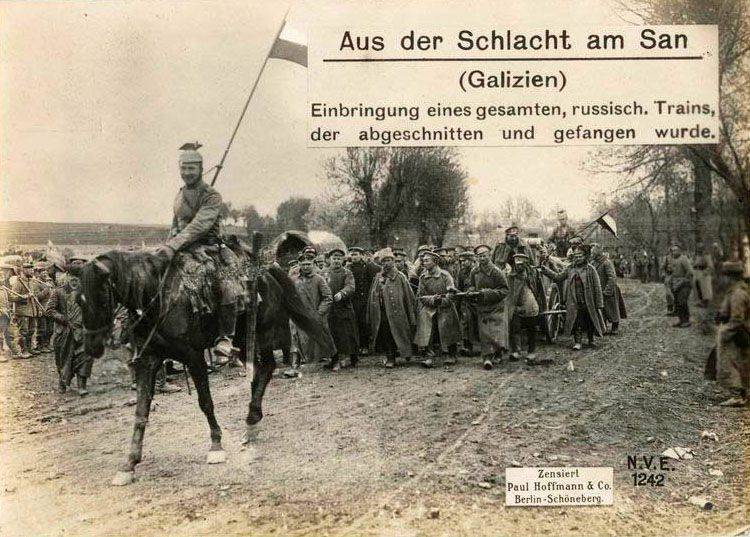
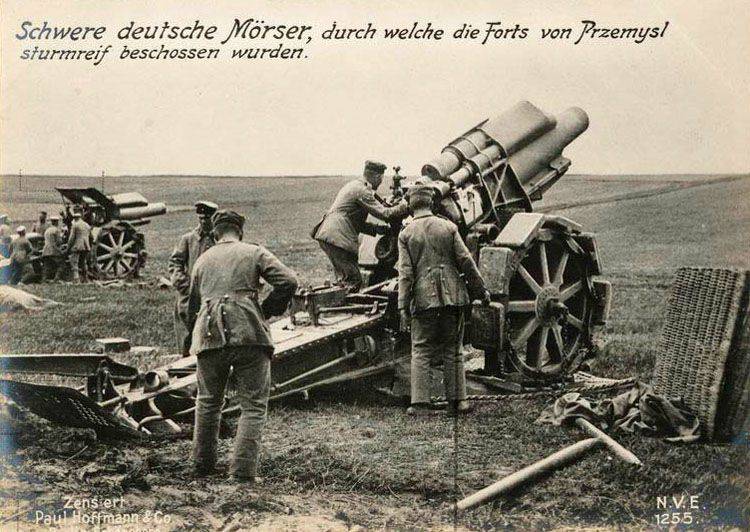
Commander Radko-Dmitriev asked for permission to withdraw troops for San, but the Supreme Commander categorically banned. After all, then it would be necessary to withdraw the neighboring armies - the right-flank 4-th army, which had just successfully attacked the left-flank 8-th army, holding the Carpathian passes. The withdrawal of the 3 Army poured into the general retreat of the troops of the South-Western Front. The command of the South-Western Front believed that the 3 Army now had enough troops to stop the enemy. But Radko-Dmitriev has already lost the threads of control, and the army turned into unorganized crowds. The commander rode piecemeal, trying to stop the troops. The army turned into teams of the detachment, and in some places just into the crowd. Some troops tried to break through to the east, others surrendered.
It is good that the German command also blundered, repeated its previous mistakes, and that the retreat of the 3 army could lead to a catastrophe. The German command missed the opportunity to finish off the army of Radko-Dmitriev and surround most of Brusilov's 8 army. The Germans didn’t remember about maneuvering, just like Russian troops went into frontal attacks, losing a lot of people. Where the Austrians and the Germans met strong resistance, they stopped, did not try to get around, pulled up artillery and, having shot our position, continued to move. As a result, the Austro-German offensive developed slowly, German troops could not surround the significant forces of the Russian army. Russian troops could retreat and snap at the new frontiers. The remnants of the 3 Army were able to escape, avoiding encirclement.
In connection with the continuous retreat of the 3 Army of Radko-Dmitriev, the front command, finally, on May 10, after 9 days of bloody battles, was forced to withdraw the units of the 4 and 8 armies adjacent to its flanks Western front is a new, defensive task. Our troops were to keep Eastern Galicia, clinging to the defensive lines of the San and Dniester rivers.
Thus, the 3-th Army 13 May moved to the river. San Radko-Dmitriev was replaced as commander of the army by General L. V. Leshem, downgraded to the corps commander. By May 15, the South-Western Front withdrew its troops and occupied a new location: the 3 Army stood on the r. San, 8-I army is located in the interval between the pp. San and Dniester, 4-I army pulled its left flank to the river. Wisla; the rest of the armies of the front, 11 and 9, received the task of actively defending the r. Dniester and the Russian border to Romania.
As a result of the Gorlitsky breakthrough, the successes of the Russian troops in the 1914 campaign of the year and in the Carpathian operation were frustrated, and the threat of abandoning Galicia and Poland arose. The Russian army only captured lost about 325 thousand people. 3-I army suffered a heavy defeat. The British representative at the 3 Army reported gloomily these days to London: "This army is now a crowd that is harmless to the enemy."
The death of the "Steel" Kornilov Division
It must be said that during this retreat, the 48-i "Steel" division, under the command of Lavr Georgievich Kornilov, died. The division fought in the Carpathian Mountains on the Dukla Pass as part of Brusilov's 24 Corps. Kornilov was a brave commander, whom the soldiers literally idolized. He treated with great attention to their life, demanded a fatherly attitude to the lower ranks, but also expected from them initiative, precise execution of orders. Brusilov, who disliked Kornilov, nevertheless gave him his due: “He was always ahead and attracted the hearts of the soldiers who loved him. They did not give themselves an account of his actions, but they always saw him on fire and valued his courage. ” And further: “A strange case, General Kornilov never regretted his division: in all the battles in which she participated under his command, she suffered terrifying losses, and meanwhile the officers and soldiers loved him and believed him. True, he did not spare himself, he was personally brave and climbed headlong. ”
General Denikin, another hero of the First World and Future Civil War, who commanded the neighboring 4 rifle (iron) brigade that fought alongside the Kornilov division, subsequently characterized his future associate: “... for me, the main features of Kornilov — the military leader: a great the ability to educate the troops: he made an excellent combat division in a few weeks from the second-grade part of the Kazan District; determination and extreme persistence in the conduct of the most difficult, it seemed doomed operation; extraordinary personal courage, which terribly impressed the troops and created great popularity among them; finally, the high observance of military ethics, with respect to neighboring units and comrades, is a characteristic that both commanders and military units often sinned against. ”
The “steel” division, which is being transferred to the heaviest sectors of the front, has written more than one glorious history in the chronicle of the First World War. During the Gorlitsk operation, when the 24 corps was transferred to the 3 army, the Kornilov division covered the retreat of the remaining troops. And in the chaos of retreat, she received the order of withdrawal belatedly. On the plain, two German divisions blocked the exits from the mountains. Through the pass, following the regiments of the Kornilov division, were Austrian troops. Under the “Steel” division there was a medical unit of Nikolai Rodzianko, the son of the chairman of the State Duma. The staff managed to study the local paths well and Rodzyanko suggested Kornilov to withdraw his troops using roundabout paths. But the troops were greatly stretched, Kornilov could not leave the regiments and returned with the headquarters to the troops.
Sanitary squad Rodzianko managed to get out of the environment. All the wounded, rear units and part of the wagon train left the “boiler”. Rodzianko was awarded the Order of St. Vladimir with swords. However, the enemy found a gap in the encirclement, blocked the last paths. Kornilov led the troops to the breakthrough, and he personally led one of the battalions, covering the withdrawal of the other units. Many of the soldiers made their way, carried the banners of the division and regiments. However, almost the entire cover squad fell in an unequal battle that lasted several days. Kornilov was twice wounded in an arm and a leg and among only 7 of the survived fighters of the battalion fell in the Austrian captivity.
The commander of the 24 Corps, General Tsurikov, considered Kornilov responsible for the death of the 48 Division and demanded a trial of him. But General Ivanov considered the com-front differently, he highly appreciated the feat of the 48 division and sent the Supreme Commander Grand Prince Nikolai Nikolayevich a petition "about exemplary rewarding of the remnants of the bravely penetrated units of the 48 division and, especially its hero, the chief of the division of General Kornilov" Emperor Nicholas II signed a decree awarding General Kornilov with the Order of St. George 3 degree. Lavr Georgievich escaped from the Austrian captivity in the summer of 1916, and continued to serve in the Russian army.
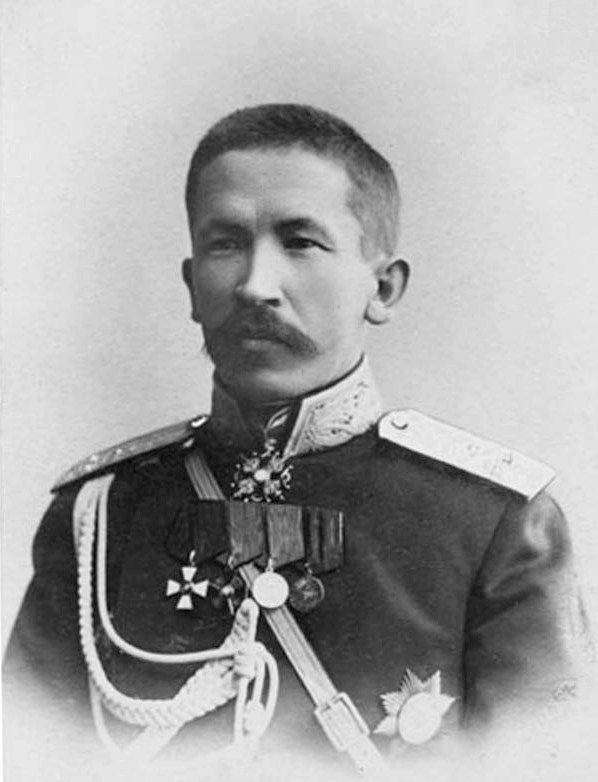
Lavr Georgievich Kornilov in 1916 year
The retreat of other troops was also accompanied by great difficulties. The enemy tried to encircle Brusilov's entire 8 army. Austrian troops were pressing on the Carpathian passes, trying to pin down the Russians in battle and give Mackensen time to go to the rear of the 8 Army. But Brusilov turned out to be wiser than Radko-Dmitriev. At the beginning of the battle, he sent hospitals and transports to the rear. And departed secretly. Until the very last moment they misled the enemy and strengthened their defenses. In the fortifications remained mobile teams with machine guns, which fired a disturbing fire while the rest of the troops retreated. Ways of departure were determined in advance, they walked quickly and broke away from the enemy. As a result, Brusilov's army safely left the prepared trap.
And on the left flank, the 11-I and 9-i armies were still advancing, pushing the Southern army of Lizingen. Their commanders did not understand why they should retreat, abandon their positions. However, they were told that if they hesitated, they would not be allowed to go down from the passes, they would block them. When the 11 Army corps turned back, walking along narrow mountain roads, 8 and 3 of the Austrian armies left on the plains to the plain, they turned south, aiming at the rear of the 2 Russian army.
At the junction of the 8-th and 11-th armies acted 4-th "Iron" division of Denikin (in April it was deployed from the "iron" brigade). Denikin's division covered the retreat of its neighbors, took a hit. Russian soldiers fought off attack after attack, suffered huge losses, but fulfilled the task. 11-I army managed to retreat. Denikin's division suffered severe losses, one of the regiments fell into a semiring, was almost completely knocked out.
Russian 122-mm howitzer at the front. Summer 1915
To be continued ...
- Alexander Samsonov
- 1915 Campaign
Military plans of the Entente and the Central Powers for 1915 year
Death of the 20 Russian Corps
"Rubber War" in the Carpathians
Battle for Prasnysh
Italian "jackal" enters the war
Battle of the Isonzo
Second Battle of the Isonzo
Germany turns east
Bosphorus bait for Russia
Gorlitsky breakthrough
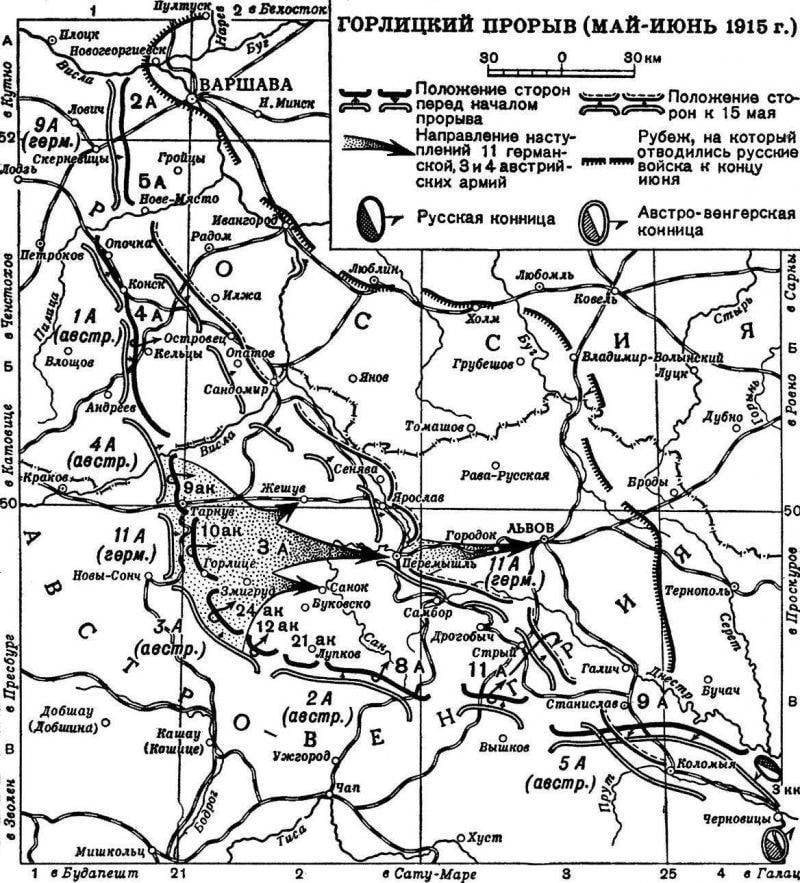
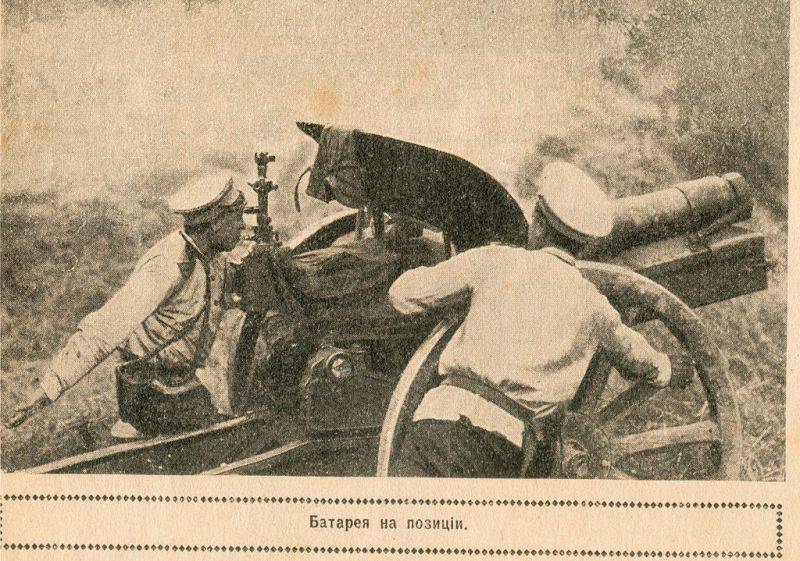
Information